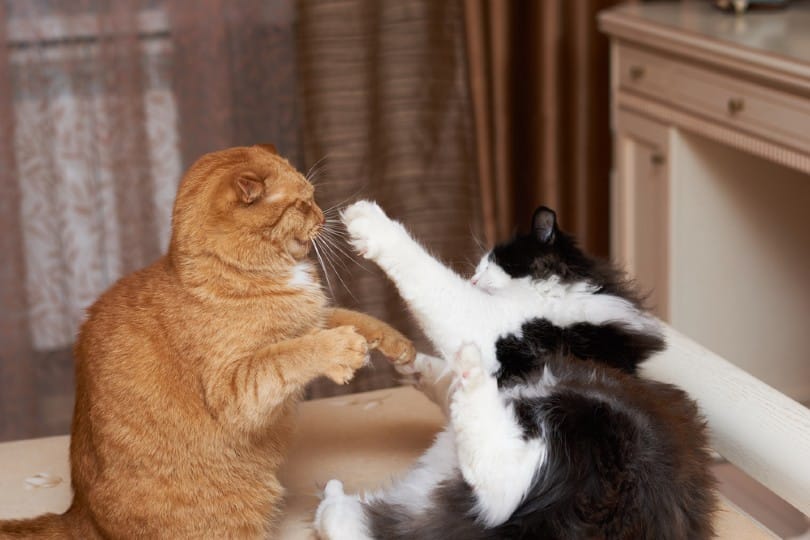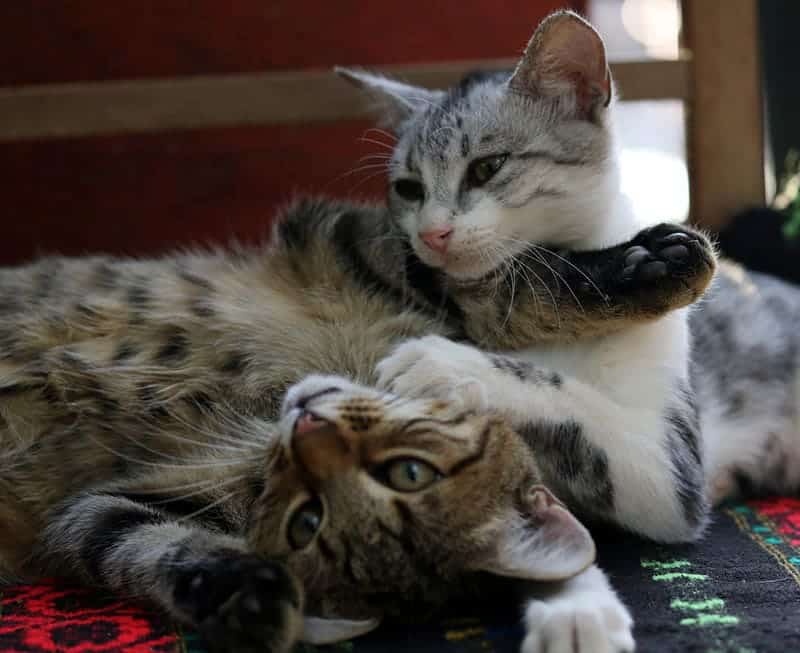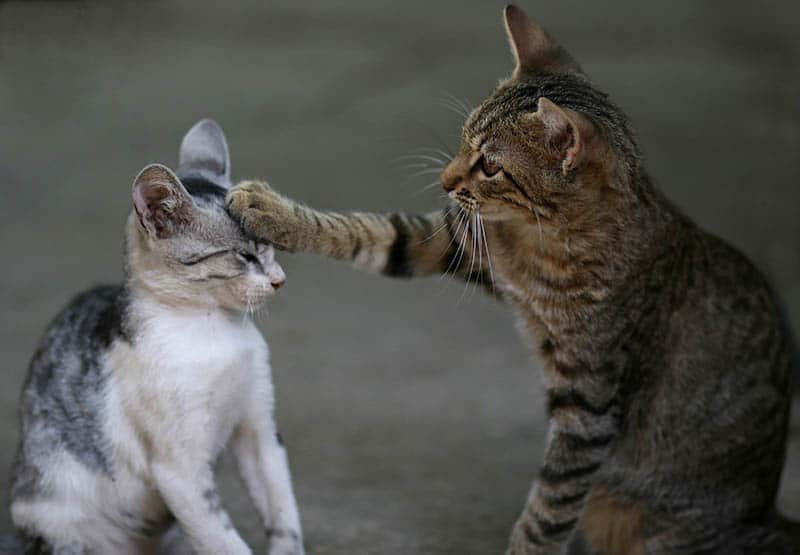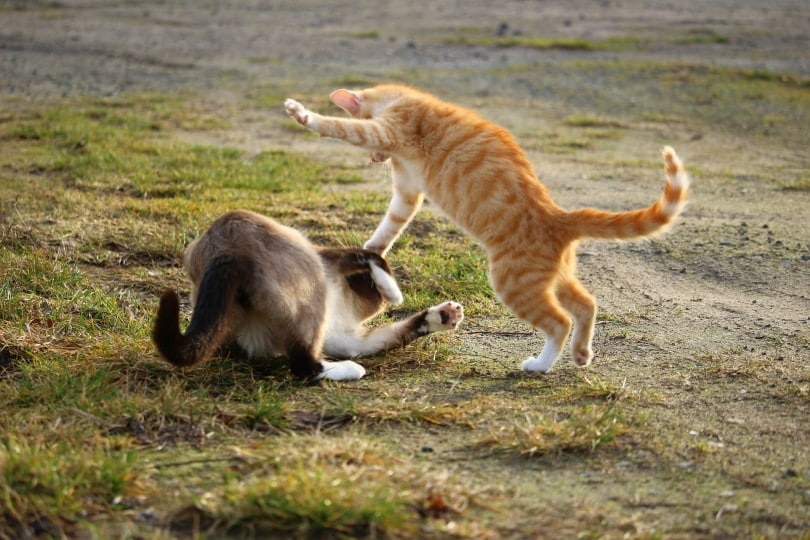Click to Skip Ahead
Cats seemingly never grow up. Even the eldest of cats is known to have a little fun now and then, swatting a fly or two when relaxing outside. Play is intrinsic in cats, and for good reason. It helps cats develop physical coordination and develop problem-solving skills. It’s also through play that cats can grow their predatory instincts and sharpen their hunting skills. It’s normal if play is a bit rough at the beginning, but if it doesn’t improve over time you might have to take other actions.
However, it’s a whole other story when your older cat starts playing a little too rough with the younger ones. There’s always the possibility they could hurt them, and as a proud parent of an adorable kitten, it’s only natural for you to worry. But should you really? Keep reading to find out.
The 4 Reasons Why Your Older Cat is Too Rough with Your Kitten
There are plenty of reasons why your older cat might be too aggressive to the younger ones. Here are some of them:
1. Errant Upbringing
Play behavior varies from one cat to the next; while some cats play gently, others don’t. The primary reason is how the kitties in question were brought up. Cats removed too early from their mothers never learn how to play gently with others. Without an adult to show them the way, the cats grow up to become aggressive players.

2. A Lack of an Outlet for Expression
Like humans, cats also need to blow off some steam. Without an outlet for expression, cats will actively seek others to play with. It’s not uncommon for them to play too aggressively to unleash all the welled-up tension inside them. This is perfectly normal, and the aggression should dwindle with time.
Playing is an important part of keeping your cat mentally and physically engaged, and a great toy will make it much easier. We like Hepper's Catnip Stick Toys because they're sturdy enough to handle intense play and completely filled with organic catnip. You'll love the fun range of pastel colors and your cat will enjoy the prey-like shape!
At Catster, we’ve admired Hepper for many years and decided to take a controlling ownership interest so that we could benefit from the outstanding designs of this cool cat company!
3. Mock Aggression
As mentioned earlier, cats never outgrow their playfulness. As such, they’ll still exhibit their kitten-like behavior well into adulthood. The only difference is that their bodies are now full-grown and could cause actual injury to kittens.
While you might want to punish your cat for the aggressive behavior. This will only increase their anxiety and worsen their aggression. Instead, you might want to consider other alternatives that we’ll discuss later on.

4. Jealousy
When you introduce a new kitten into the household, it’s normal for your current cat to feel threatened or a tad jealous. This jealousy may play out as overly aggressive play-fighting. The cat’s first instinct is to think that the newcomer is invading its territory. This is usually accompanied by hissing, growling, and swatting.
Should I Be Worried?
It’s easy to think that your cat might one day kill your precious kitten. However, you have nothing to worry about. While the cat might bite and kick your kitten, it’s not aiming to kill it. In most cases, the aggression will wear out, but you might have to proactively help your cat adjust to its new housemate.
Will My Older Cat Ever Accept the New Kitten?
After a couple of weeks of aggressive behavior, you might think that your cat will never accept the new kitten. Don’t be discouraged yet. Cats take different times to adjust to new kittens. While others might become the best of pals in a few days, others might take months.
Typically, the older the cat is, the easier it will be for it to accept the new kitten. Also, male kittens take longer to accept and adapt to the situation than female cats. In rare cases, the cat might completely reject the kitten. If that’s the case, you might want to consider behavioral therapy for cats.

How Long Will It Take for My Cat to Get Used to the Kitten?
Cats take quite a bit of time to accept new feline companions. No two cats are the same, and the adjustment period varies from cat to cat. Felines are known to be solitary and highly territorial. Extremely territorial cats will isolate themselves when you introduce a new kitten to your home.
Like any other friendship, your cat will take some time to build a solid relationship with the kittens. It takes about several weeks to months for your cat to fully accept the new kitten. Just be patient, and before you know it, they’ll be bosom buddies.
Introducing Your Cat to a Kitten in 2 Steps
Just putting both cats in the same room might not end up well, especially for the younger kitten. Doing so only triggers the older cat’s territorial panic and leads to aggression that may injure the kitten. Consider taking this approach instead.
First, you’ll want to prepare your cat for the new guest. You can accomplish this by doing two things:
1. Introduce Schedule-Feeding
Most cat parents are guilty of free-feeding their cats, where they feed their pet whenever they feel like it. While doing so is perfectly okay, scheduled feeding is more appropriate when introducing new cats to each other. This will give them an avenue for shared experiences that’ll form the foundation of their new friendship.
Vets recommend that you feed your cat twice a day. First in the morning and the next time in the evening. However, it’s okay to feed the cat once a day, provided you keep a definite schedule.
2. Set up Your Cat’s Base Camp
The base camp is your current cat’s desecrated area of isolation or territory. This is usually the place where your cat spends most of its time. It could be your bedroom or home office. Anything goes, provided the space gives your cat a homely feel.
The next step is the most difficult step of the process: site swapping. This is where you introduce the current cat to the kitten. However, follow the below steps to do so seamlessly.
- Gently carry the older cat to the bathroom and shut the door
- Carve out some space for the kitten’s base camp and let it stay there
- Introduce the older cat to the kitten’s base camp and let it stay there
- Let the new kitten explore the rest of the home
Do this over and over again until the two cats get used to each other. Be patient and let the bond grow with time. Don’t forget a bit of aggressive play is part of the process.
Final Thoughts
Don’t get too worked up when you see your older cat being a little rough with the kittens. This is perfectly normal and won’t likely result in injuries. If the aggression is territorial, slowly introduce the cats to each other and let them share a common meal. They’ll get used to each other in no time.
Featured Image Credit: rihaij, Pixabay














